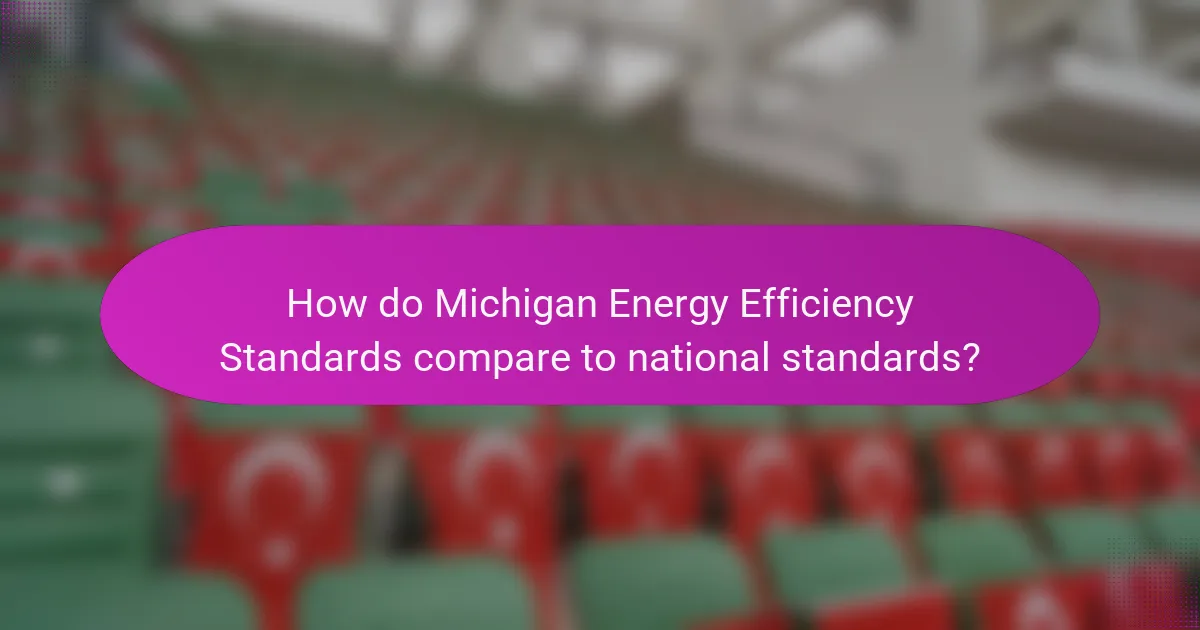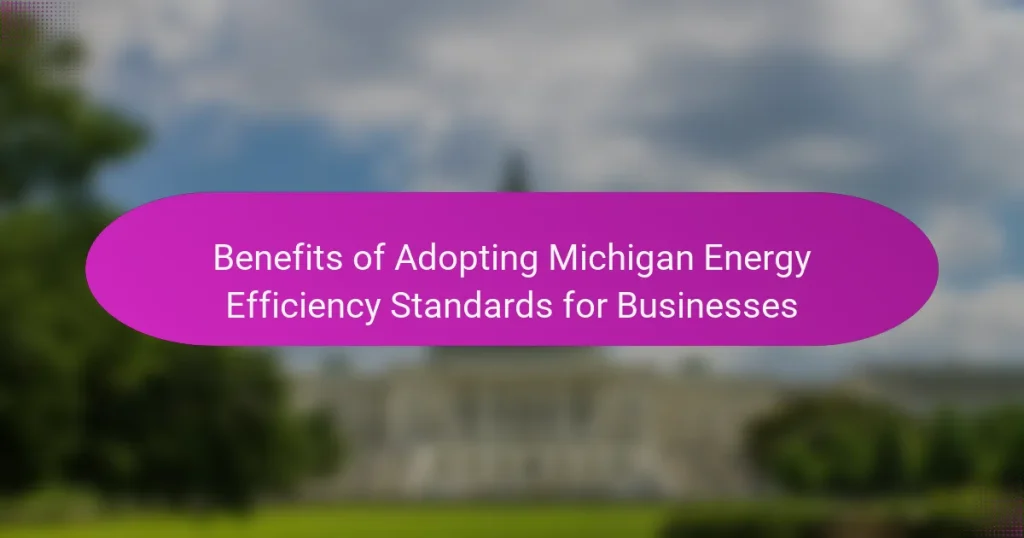
What are the Michigan Energy Efficiency Standards for Businesses?
The Michigan Energy Efficiency Standards for Businesses are regulations designed to promote energy conservation. These standards require businesses to implement specific energy-saving measures. Compliance often involves upgrading lighting, HVAC systems, and insulation. The standards aim to reduce overall energy consumption and greenhouse gas emissions. Additionally, they help businesses save on utility costs. The Michigan Public Service Commission oversees these regulations. Businesses can benefit from incentives for meeting the standards. These incentives may include rebates and grants for energy-efficient upgrades.
How were the Michigan Energy Efficiency Standards developed?
The Michigan Energy Efficiency Standards were developed through legislative action and stakeholder collaboration. The Michigan Public Service Commission played a key role in this process. They established guidelines to improve energy efficiency across various sectors. The standards were informed by energy audits and assessments of existing practices. Stakeholders, including utility companies and consumer advocacy groups, contributed to the discussions. This collaborative approach ensured that diverse perspectives were considered. The resulting standards aimed to reduce energy consumption and promote sustainability. They have been updated periodically to reflect technological advancements and evolving needs.
What stakeholders were involved in creating these standards?
The stakeholders involved in creating Michigan Energy Efficiency Standards include state government agencies, utility companies, and industry representatives. State government agencies set regulatory frameworks and guidelines. Utility companies provide insights on energy consumption and efficiency measures. Industry representatives contribute expertise on practical applications and impacts of the standards. Additionally, environmental organizations advocate for sustainable practices. These stakeholders collaborate to ensure the standards are effective and beneficial for businesses. Their combined efforts help shape policies that promote energy efficiency in Michigan.
What are the key components of the Michigan Energy Efficiency Standards?
The key components of the Michigan Energy Efficiency Standards include energy savings targets, performance metrics, and utility program requirements. Energy savings targets mandate utilities to achieve specific reductions in energy consumption. Performance metrics assess the effectiveness of energy efficiency programs. Utility program requirements guide how energy efficiency initiatives are designed and implemented. These components aim to promote sustainable energy use and reduce overall energy costs for consumers. The standards are enforced by the Michigan Public Service Commission, ensuring compliance and accountability among utilities.
Why should businesses consider adopting these standards?
Businesses should consider adopting Michigan Energy Efficiency Standards to reduce operational costs. Implementing these standards can lead to significant energy savings. For example, businesses may reduce energy consumption by up to 20%. Lower energy bills directly enhance profit margins. Additionally, adopting these standards can improve a company’s public image. Consumers increasingly prefer environmentally responsible businesses. Compliance with these standards may also provide access to financial incentives. Many programs offer rebates or tax credits for energy-efficient upgrades. Overall, adopting these standards aligns with both economic and environmental goals.
What immediate benefits can businesses expect from adoption?
Businesses can expect immediate cost savings from adopting Michigan Energy Efficiency Standards. These standards reduce energy consumption, leading to lower utility bills. For example, businesses can save up to 20% on energy costs. Improved energy efficiency also enhances operational performance. This can result in better equipment longevity and reduced maintenance costs. Additionally, businesses may qualify for incentives or rebates from utility companies. Enhanced sustainability practices can improve a company’s public image. Overall, these benefits contribute to a healthier bottom line and competitive advantage.
How do these standards contribute to long-term sustainability?
These standards contribute to long-term sustainability by promoting energy efficiency and reducing resource consumption. By implementing energy-efficient practices, businesses lower their operational costs. This reduction in energy use also leads to decreased greenhouse gas emissions. According to the U.S. Department of Energy, energy efficiency improvements can reduce energy consumption by up to 30%. Additionally, these standards encourage the use of renewable energy sources. This shift supports cleaner energy generation and reduces reliance on fossil fuels. Overall, adopting these standards fosters a sustainable business model that benefits the environment and the economy.
What specific advantages do Michigan Energy Efficiency Standards offer to businesses?
Michigan Energy Efficiency Standards provide significant advantages to businesses. They help reduce operational costs through lower energy bills. Businesses can receive financial incentives for implementing energy-efficient technologies. These standards also enhance competitiveness by improving sustainability credentials. Compliance with energy efficiency standards can lead to tax benefits and rebates. Additionally, businesses may experience increased property value due to energy-efficient upgrades. Overall, these standards promote a more sustainable business model while improving financial performance.
How can these standards lead to cost savings for businesses?
These standards can lead to cost savings for businesses by reducing energy consumption. Lower energy usage directly decreases utility bills. Implementing energy-efficient practices can also minimize maintenance costs. Energy-efficient equipment often has a longer lifespan, reducing replacement expenses. Additionally, businesses may qualify for rebates and incentives for adopting these standards. According to the Michigan Public Service Commission, energy efficiency programs can save businesses up to 20% on energy costs. Overall, these standards create a more sustainable and economical operational framework.
What impact do they have on a business’s reputation and customer trust?
Adopting Michigan Energy Efficiency Standards positively impacts a business’s reputation and customer trust. Businesses that implement these standards demonstrate a commitment to sustainability. This commitment resonates with environmentally conscious consumers. Studies show that 66% of consumers prefer to buy from brands that are environmentally responsible. Enhanced reputation leads to increased customer loyalty. Companies may also experience improved public relations and brand image. This can result in positive word-of-mouth marketing. Overall, energy efficiency standards foster trust and credibility among consumers.

How do Michigan Energy Efficiency Standards compare to national standards?
Michigan Energy Efficiency Standards are generally more stringent than national standards. They require higher efficiency levels for appliances and equipment. For example, Michigan mandates specific energy savings for lighting and HVAC systems that exceed federal requirements. Additionally, Michigan’s standards often include more comprehensive measures for building codes. These measures aim to reduce overall energy consumption and promote sustainability. The state also emphasizes renewable energy integration more than many national standards. Consequently, businesses in Michigan may benefit from reduced energy costs and improved operational efficiency.
What are the key differences between state and national energy efficiency standards?
State energy efficiency standards are set by individual states, while national energy efficiency standards are established by federal regulations. State standards can vary significantly based on local energy needs and policies. National standards provide a baseline that all states must meet but allow for state-specific enhancements. For example, California has stricter standards than the national baseline due to its unique climate and energy goals. The U.S. Department of Energy oversees national standards, while state agencies manage local regulations. This creates a framework where states can innovate beyond federal requirements. Variations in standards can lead to differences in energy savings and compliance costs for businesses.
How do compliance requirements vary between Michigan and federal regulations?
Compliance requirements in Michigan differ from federal regulations primarily in their specific energy efficiency standards. Michigan has implemented state-specific mandates that exceed federal guidelines in some areas. For example, Michigan’s energy efficiency programs require utilities to achieve a minimum savings target of 1% of their total energy sales annually. In contrast, federal regulations do not impose such specific savings targets. Additionally, Michigan emphasizes renewable energy integration more than federal standards, which can lead to more stringent compliance measures for businesses operating within the state. These differences create a unique regulatory landscape that businesses must navigate to ensure compliance with both state and federal requirements.
What unique challenges do Michigan businesses face in meeting these standards?
Michigan businesses face unique challenges in meeting energy efficiency standards due to regulatory complexity. The varying standards across different sectors can create confusion. Additionally, businesses often lack the financial resources for necessary upgrades. High upfront costs for energy-efficient technologies can deter investment. Limited access to technical assistance further complicates compliance efforts. Seasonal fluctuations in energy demand can also impact planning and implementation. Many businesses struggle with understanding the long-term benefits versus short-term costs. Overall, these factors create a challenging environment for Michigan businesses trying to meet energy efficiency standards.
What role do incentives play in adopting Michigan Energy Efficiency Standards?
Incentives are crucial for adopting Michigan Energy Efficiency Standards. They encourage businesses to invest in energy-efficient technologies. Financial incentives, such as rebates and tax credits, reduce initial costs for companies. These incentives can lead to significant long-term savings on energy bills. According to the Michigan Public Service Commission, energy efficiency programs saved consumers over $5 billion from 2009 to 2019. This financial benefit motivates businesses to comply with efficiency standards. Additionally, incentives help businesses improve their sustainability profiles. Enhanced sustainability can attract environmentally conscious consumers. Thus, incentives play a vital role in promoting the adoption of energy efficiency standards in Michigan.
What financial incentives are available for businesses in Michigan?
Businesses in Michigan can access various financial incentives. These include tax credits, grants, and low-interest loans. The Michigan Economic Development Corporation (MEDC) offers programs like the Michigan Business Development Program. This program provides grants to businesses creating new jobs or investing in facilities. Additionally, there are energy efficiency incentives available through utility companies. These incentives help businesses reduce energy costs and improve sustainability. The state’s focus on energy efficiency aligns with broader economic development goals.
How can businesses leverage these incentives to enhance their operations?
Businesses can leverage energy efficiency incentives to reduce operational costs. By adopting Michigan Energy Efficiency Standards, they can qualify for rebates and grants. These financial incentives lower the initial investment for energy-efficient technologies. Implementing such technologies can lead to significant savings on utility bills. For example, businesses can save up to 30% on energy costs by upgrading to efficient lighting and HVAC systems. Additionally, improved energy efficiency can enhance productivity by creating a better working environment. Access to these incentives encourages businesses to invest in sustainable practices. Ultimately, this leads to long-term operational benefits and a positive environmental impact.

What are the best practices for implementing Michigan Energy Efficiency Standards?
The best practices for implementing Michigan Energy Efficiency Standards include conducting an energy audit to assess current consumption. This audit identifies areas for improvement and potential energy savings. Training staff on energy-efficient practices is essential for successful implementation. Engaging stakeholders ensures that everyone understands the standards and their importance.
Utilizing incentives and rebates offered by the state can reduce costs associated with upgrades. Regularly monitoring energy usage helps track progress and identify further opportunities for efficiency. Collaboration with local utility companies can provide additional resources and support. Following these practices can lead to significant energy savings and compliance with state regulations.
What steps should businesses take to ensure successful adoption?
Businesses should conduct a thorough assessment of their current energy practices. This includes identifying areas where energy efficiency can be improved. Next, they should engage stakeholders to gather input and build support for the initiative. Training employees on new standards and practices is essential for successful implementation. Businesses should also set clear goals and metrics to measure progress. Regularly reviewing and adjusting strategies based on performance data will enhance effectiveness. Collaborating with energy efficiency experts can provide valuable insights and resources. Lastly, businesses should communicate successes to reinforce commitment and encourage ongoing engagement.
How can businesses assess their current energy usage before implementing the standards?
Businesses can assess their current energy usage by conducting an energy audit. An energy audit involves a detailed examination of energy consumption patterns. This includes evaluating energy bills, inspecting equipment, and analyzing operational practices. Businesses can also utilize energy monitoring tools for real-time data. Energy benchmarking against similar organizations provides additional insights. According to the U.S. Department of Energy, audits can identify energy-saving opportunities that reduce costs. Implementing these assessments helps businesses prepare for energy efficiency standards.
What resources are available to assist businesses in the implementation process?
Businesses can access various resources to assist in the implementation process of Michigan Energy Efficiency Standards. These resources include state-sponsored programs that offer financial incentives, technical assistance, and training. The Michigan Energy Office provides guidance on best practices and compliance strategies. Additionally, local utilities often have energy efficiency programs that support businesses in upgrading equipment. Non-profit organizations may also offer consulting services to facilitate the implementation of energy-saving measures. These resources aim to enhance energy efficiency while reducing costs for businesses.
What common challenges do businesses encounter when adopting these standards?
Businesses encounter several common challenges when adopting Michigan Energy Efficiency Standards. These challenges include high initial costs associated with implementation. Many businesses face difficulties in securing funding or financing for energy-efficient upgrades. Additionally, there can be a lack of understanding or knowledge about the standards among staff. This knowledge gap can lead to improper implementation or compliance issues.
Another challenge is the complexity of navigating regulatory requirements. Businesses may struggle to keep up with changes in legislation related to energy efficiency. Limited access to qualified contractors for installation can also hinder progress. Finally, businesses often experience resistance to change from employees who are accustomed to existing practices. These factors collectively hinder the effective adoption of energy efficiency standards in Michigan.
How can businesses overcome resistance to change within their organization?
Businesses can overcome resistance to change by fostering open communication. Engaging employees in discussions about changes encourages buy-in. Providing clear information about the benefits of the change can alleviate fears. Training programs can equip employees with the skills needed for new processes. Involving employees in the change process increases their sense of ownership. Recognizing and rewarding adaptability can motivate others to embrace change. Research shows that organizations with strong change management practices see a 70% success rate in transformations. This highlights the importance of structured approaches in overcoming resistance.
What are the potential pitfalls to avoid during the adoption process?
Potential pitfalls to avoid during the adoption process of Michigan Energy Efficiency Standards include inadequate stakeholder engagement. Businesses must involve all relevant parties early in the process. Failing to do so can lead to resistance and misalignment of goals. Another pitfall is neglecting to assess existing infrastructure compatibility. Businesses should analyze current systems to ensure they can integrate new standards effectively. Overlooking training needs for staff is also critical. Employees must understand the new standards to implement them successfully. Lastly, underestimating the costs associated with compliance can lead to financial strain. Businesses should budget appropriately for implementation and ongoing maintenance.
What practical tips can businesses follow to maximize the benefits of adopting Michigan Energy Efficiency Standards?
Businesses can maximize the benefits of adopting Michigan Energy Efficiency Standards by conducting energy audits. Energy audits identify areas where energy consumption can be reduced. Implementing recommended changes from these audits can lead to significant cost savings. Training employees on energy-efficient practices enhances overall energy management. Utilizing energy-efficient technologies and equipment reduces operational costs. Participating in utility incentive programs can provide financial support for upgrades. Regularly monitoring energy usage helps track improvements and identify further savings. Finally, staying informed about updates to the standards ensures compliance and maximizes benefits.
The main entity of the article is the Michigan Energy Efficiency Standards for Businesses, which are regulations aimed at promoting energy conservation and reducing greenhouse gas emissions. The article outlines the development, key components, and benefits of these standards, emphasizing their role in reducing operational costs through energy savings and financial incentives. It also discusses the collaborative efforts of various stakeholders in creating these standards and compares them to national regulations, highlighting their stricter requirements. Additionally, the article addresses the challenges businesses face in compliance and offers practical tips for successful implementation, ultimately illustrating how adopting these standards can enhance sustainability and improve a company’s reputation.


